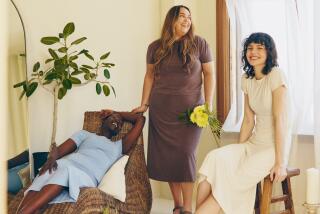Does Casual Clash With Success? : Some Women and Minorities Worry That Relaxed Attire Hurts Professional Image
- Share via
On casual Fridays--when many of her colleagues sport jeans and sneakers at the office--Ayanna Sales doesn’t stray far from her regular professional attire. As a black woman in a corporate environment, she is reluctant to let go of the image of authority that it affords.
“When you look the part, some people will think you’re doing the part,” said Sales, a management associate at Nissan Motor Co. in Gardena. “If you carry a professional image, then people will accept you as that.”
The trend toward a more casual dress code in the workplace presents a problem for some women and minority professionals. Because they feel they have to work especially hard to be taken seriously, some are concerned that wearing casual dress may jeopardize their status. Dressing casually, some say, hurts their professional image and reinforces stereotypes that they are inferior or subordinate.
Today, it is estimated that 90% of all corporations have either a dress-down day or a relaxed dress code. Many employers see dress-down days as a no-cost perk that boosts morale and encourages teamwork.
“In the broadest sense, it’s part of a movement toward what some people call ‘one work force’ where there are no signs of rank and class,” said Marty Cohen, vice president of client services at the Work in America Institute, a think tank on workplace issues in Scarsdale, N.Y.
But for workers who say the assumption is often that they are not in an authority position, formal business attire allows them to distinguish themselves.
In response to a 1994 survey of more than 400 professional men and women conducted by image consultants Karen and Donald Kaufman, 57% of women said they believe they lose status and authority more than men when they dress down for business.
One female management consultant wrote on the questionnaire: “Men can afford to be more casual without losing their power and authority. Women still need more props.”
A female financial executive wrote: “Women are assumed to be in lower-level positions. Business clothing can override that impression but casual clothes do not.”
The Kaufmans, partners in Philadelphia-based Kaufman Professional Image Consultants, help corporations implement dress codes and advise individual executives.
“What business attire did, like any uniform, [was] let people know who the players are and what their role is,” Karen Kaufman said. Casual dress days, she added, have led to some confusion about these roles.
“Women and minorities . . . have worked so hard to gain their credibility and authority in the workplace,” she said. “In many ways, [casual dress] visually undermines or neutralizes what they’ve accomplished.”
Charlene Walker, co-owner of Women’s Focus, a Tustin career development and corporate outplacement company, concurs.
“We can’t dress casually, we just can’t afford to do it,” she said. “It’s a battle because we’re still breaking ground and we cannot afford to give anyone any cause for not promoting us.”
Bernard Jennings, a vice president at Norrell Services Inc., a temporary employment agency in downtown L.A., said dressing down in the workplace often brings racial stereotypes to the forefront. When dressed in casual business attire--slacks and a golf shirt--Jennings, who is black, said some people in the building where he works have assumed him to be a janitor or a security guard. And in the lobby of his office, he senses visitors giving him a strange look when he isn’t wearing a suit.
“They will sometimes do a double take if I am dressed casually until I walk into my office, then they look differently,” Jennings said. “People automatically assume certain things when they see African American males.”
Black men and women may have difficulty gaining authority and credibility because white people often assume that they are not qualified, according to Elijah Anderson, professor of sociology at the University of Pennsylvania.
“Many blacks have to campaign for the status and regard that other people take for granted,” he said. “One of the ways of commanding respect in the workplace is, indeed, to dress the part.”
Even the idea that dressing casually allows employees to relax presents a dilemma for some workers.
“Some minorities in organizations feel that they’re always on, that there’s no time out,” Jennings said. Women and minorities “will tend not to be casual in their dress, in their language or behavior for fear that some people will use that display to discredit them.”
Nevertheless, some corporate executives don’t see any problem with a relaxed dress code, and say most employees react positively to the change.
A 1995 survey commissioned by Levi Strauss & Co. and the Society for Human Resource Management found that the benefits of a casual dress policy far outweigh the drawbacks. Of the 505 human resource professionals surveyed, 85% strongly agreed that wearing casual clothing at work improves morale and 82% view it as an added employee benefit.
Also, since the first national survey was conducted in 1992, the percentage of firms that have some form of casual dress policy has increased to 90% from 63%.
As long as workers don’t get carried away, AT&T; public relations manager Celeste Alleyne said, they shouldn’t have to worry about any problems. “Unless we’re going to go out to play volleyball or to the company picnic, we don’t dress in jeans and sneakers,” she said. “There’s a way to wear business casual and . . . still look professional.”
More to Read
Inside the business of entertainment
The Wide Shot brings you news, analysis and insights on everything from streaming wars to production — and what it all means for the future.
You may occasionally receive promotional content from the Los Angeles Times.










